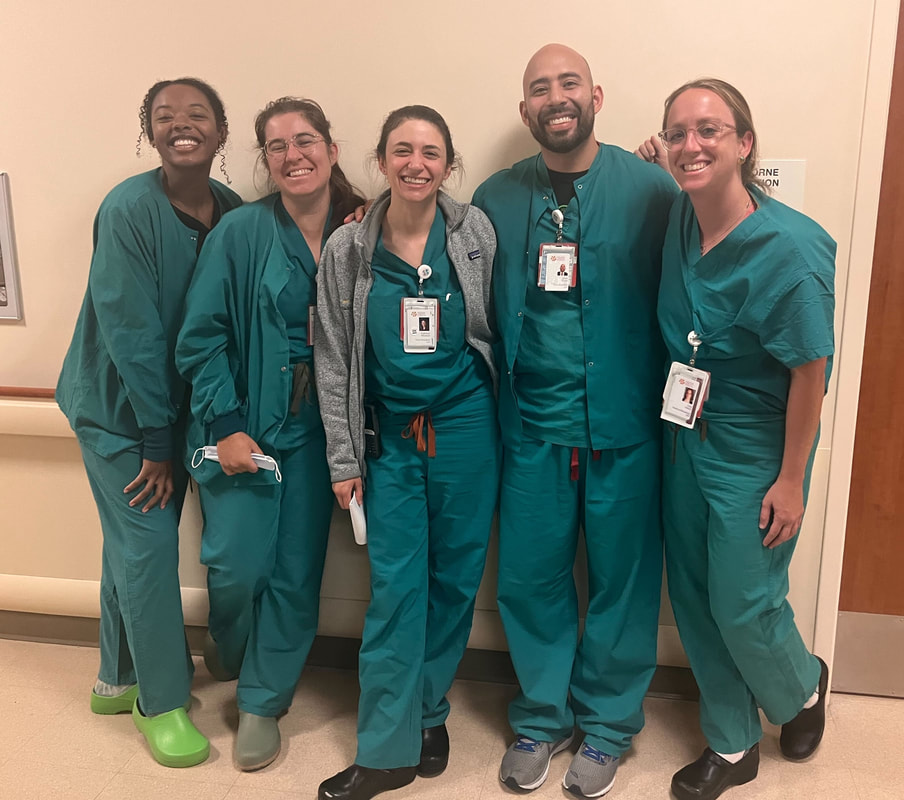OBSTETRICS
Duration: 28 weeks ( 6 weeks night float)
Location(s): Sutter Santa Rosa Regional Hospital
Rotation Lead(s): Dr. Bacon & Dr. Jimenez
The residency program considers maternity care an essential part of family medicine and emphasizes a family-centered approach to pregnancy and childbirth. Residents participate in a variety of high and low-risk deliveries and deliver roughly 120 babies per month. In addition to deliveries done while on-call, residents follow OB patients in their continuity panel -- doing prenatal care, labor management, and their patients' delivers.
Residents primarily work with family physicians who do OB, but also learn from obstetricians and midwives. Finally, resident education is enhanced by program-sponsored training in the ALSO Course. Residents receive training in first trimester OB ultrasound and limited 2nd/3rd trimester ultrasound. Residents also get a variety of specialized experiences in outpatient OB including gestational diabetes clinic and a clinic for patients with substance use disorders in pregnancy. A maternal health educator works closely with the residents and their patients and doulas and are available for patients in labor. Additional elective opportunities are available with midwives at a local birth center and at a rural hospital in Lake County. Residents interested in pursuing training in surgical OB can gain experience with performing cesarean sections as senior residents, however an OB fellowship will be required to achieve competence.
Opportunities for scholarly activity and mentorship exist within the program for residents that express an interest in maternity care after graduation.
Results from recent ACGME graduate surveys show that 100% of our recent graduates feel that our program adequately prepared them to provide maternity and newborn care. Typically, 30-40% of our graduates continue to deliver babies after graduation.
Location(s): Sutter Santa Rosa Regional Hospital
Rotation Lead(s): Dr. Bacon & Dr. Jimenez
The residency program considers maternity care an essential part of family medicine and emphasizes a family-centered approach to pregnancy and childbirth. Residents participate in a variety of high and low-risk deliveries and deliver roughly 120 babies per month. In addition to deliveries done while on-call, residents follow OB patients in their continuity panel -- doing prenatal care, labor management, and their patients' delivers.
Residents primarily work with family physicians who do OB, but also learn from obstetricians and midwives. Finally, resident education is enhanced by program-sponsored training in the ALSO Course. Residents receive training in first trimester OB ultrasound and limited 2nd/3rd trimester ultrasound. Residents also get a variety of specialized experiences in outpatient OB including gestational diabetes clinic and a clinic for patients with substance use disorders in pregnancy. A maternal health educator works closely with the residents and their patients and doulas and are available for patients in labor. Additional elective opportunities are available with midwives at a local birth center and at a rural hospital in Lake County. Residents interested in pursuing training in surgical OB can gain experience with performing cesarean sections as senior residents, however an OB fellowship will be required to achieve competence.
Opportunities for scholarly activity and mentorship exist within the program for residents that express an interest in maternity care after graduation.
Results from recent ACGME graduate surveys show that 100% of our recent graduates feel that our program adequately prepared them to provide maternity and newborn care. Typically, 30-40% of our graduates continue to deliver babies after graduation.
adult medicine
Duration: 28 weeks (6 weeks night float)
Location(s): Sutter Santa Rosa Regional Hospital
Rotation Lead(s): Dr. Green & Dr. Jordan
The goals of the adult medicine service are to know and to care. First-year, and second-year residents take primary call, admitting patients through the emergency room and from the intensive care unit. A night float system in employed to reduce the burden of call and comply with work hour standards. Residents on the adult medicine service (AMS) admit patients from all our local community health centers, veterans, and unassigned patients admitted through the ER. Residents also followed these same patients admitted to the ICU under the supervision of an ICU attending.
Adult medicine residents meets twice daily throughout their day with the Family Medicine service attendings. Attendings both work morning rounds and, as in a team setting, include pharmacy, social work, and discharge planning. Protected scheduled time is provided daily for didactic teaching by the family medicine attending on the service or by visiting specialists. A night float system is employed to relieve the burden of overnight call.
Location(s): Sutter Santa Rosa Regional Hospital
Rotation Lead(s): Dr. Green & Dr. Jordan
The goals of the adult medicine service are to know and to care. First-year, and second-year residents take primary call, admitting patients through the emergency room and from the intensive care unit. A night float system in employed to reduce the burden of call and comply with work hour standards. Residents on the adult medicine service (AMS) admit patients from all our local community health centers, veterans, and unassigned patients admitted through the ER. Residents also followed these same patients admitted to the ICU under the supervision of an ICU attending.
Adult medicine residents meets twice daily throughout their day with the Family Medicine service attendings. Attendings both work morning rounds and, as in a team setting, include pharmacy, social work, and discharge planning. Protected scheduled time is provided daily for didactic teaching by the family medicine attending on the service or by visiting specialists. A night float system is employed to relieve the burden of overnight call.
pediatrics
Duration: 16 weeks
Location(s): Providence Santa Rosa Memorial Hospital/UCSF Benioff Children's Hospital, Children's Hospital of Oakland, Santa Rosa Community Health sites, Sutter Pediatric Clinic, Elise Allen Campus
Rotation Lead(s): Dr. Bernard-Pearl
Residents will learn about the care of children in a variety of settings throughout our community.
Location(s): Providence Santa Rosa Memorial Hospital/UCSF Benioff Children's Hospital, Children's Hospital of Oakland, Santa Rosa Community Health sites, Sutter Pediatric Clinic, Elise Allen Campus
Rotation Lead(s): Dr. Bernard-Pearl
Residents will learn about the care of children in a variety of settings throughout our community.
- The outpatient experience happens at several Santa Rosa Community Health sites: the Vista campus, the pediatric campus is Roseland, and at the high school-based Elise Allen campus. These settings ensure a broad experience in preventive health care, as well as management of common and complex childhood conditions.
- The inpatient experience is based at the Santa Rosa Memorial Hospital/UCSF Benioff Children's Hospital pediatric unit. Fully staffed with pediatric hospitalists, the unit provides general pediatric care for children in the North Bay and beyond. Additional pediatric services include a Level II Trauma Unit and UCSF Neonatal Intensive Care Unit.
- During the R2 year, our residents rotate through the emergency department at UCSF Benioff Children's Hospital Oakland where they manage acutely ill children with a wide range of medical conditions.
- Elective opportunities include clinics focusing on adolescent medicine, pediatric subspecialties, and pediatric urgent care. Our residents graduate with the ability to provide high quality personalized care for all children.
Musculoskeletal
Duration: 6 weeks
Location(s): Vista Family Health Center, Sutter Sports Medicine
Rotation Lead(s): Dr. Kohatsu
Care of musculoskeletal system injuries is central to the training experience of a family physician. The curriculum is designed to provide residents with extensive skill in caring for a wide range of musculoskeletal conditions and complaints. Residents learn physical diagnostic techniques and how to manage sprains, strains, fractures, etc. while working alongside family physicians, sports medicine trained specialists, foot and ankle surgeons, and orthopedic physicians and physicians assistants. In addition, our residents get valuable exposure to the complimentary care of musculoskeletal issues by attending a variety of high yield physical therapy classes, working with a community chiropractor, and participating in a series of osteopathic musculoskeletal teaching workshops.
Location(s): Vista Family Health Center, Sutter Sports Medicine
Rotation Lead(s): Dr. Kohatsu
Care of musculoskeletal system injuries is central to the training experience of a family physician. The curriculum is designed to provide residents with extensive skill in caring for a wide range of musculoskeletal conditions and complaints. Residents learn physical diagnostic techniques and how to manage sprains, strains, fractures, etc. while working alongside family physicians, sports medicine trained specialists, foot and ankle surgeons, and orthopedic physicians and physicians assistants. In addition, our residents get valuable exposure to the complimentary care of musculoskeletal issues by attending a variety of high yield physical therapy classes, working with a community chiropractor, and participating in a series of osteopathic musculoskeletal teaching workshops.
procedures
Duration: 4 weeks
Location(s): Vista Family Health Center, Sutter Stony Point, Sutter Airway
Rotation Lead(s): Dr. Jimenez
Procedures training takes place during rotations and in continuity clinics in the Family Health Center at Santa Rosa Community Health, Vista Campus, as well as at sites throughout the community, all under direct supervision of experienced clinicians. Family medicine faculty assist the residents in learning skin biopsy techniques, lesion removal, skin flaps, injections, vasectomy, colposcopy, LEEP, various other reproductive health procedures, ultrasound, and other minor surgical procedures. Residents perform skin procedures while on Dermatology and Procedures rotations, and various procedures in the health center during all three years of training. The Procedures rotation in the second and third years of residency are focused on outpatient procedures in multiple settings, including focused training in the health center.
Residents will perform a variety of procedures while serving on their inpatient medicine and obstetrics rotations, and emergency medicine rotations (at both community and pediatric sites.) Residents may use elective time in their second and third years to arrange further training in a variety of procedures, and electives previously completed by residents are in our Schoology database to assist our trainees in setting up or fine-tuning a procedure-focused (or any other) elective, including international opportunities.
Location(s): Vista Family Health Center, Sutter Stony Point, Sutter Airway
Rotation Lead(s): Dr. Jimenez
Procedures training takes place during rotations and in continuity clinics in the Family Health Center at Santa Rosa Community Health, Vista Campus, as well as at sites throughout the community, all under direct supervision of experienced clinicians. Family medicine faculty assist the residents in learning skin biopsy techniques, lesion removal, skin flaps, injections, vasectomy, colposcopy, LEEP, various other reproductive health procedures, ultrasound, and other minor surgical procedures. Residents perform skin procedures while on Dermatology and Procedures rotations, and various procedures in the health center during all three years of training. The Procedures rotation in the second and third years of residency are focused on outpatient procedures in multiple settings, including focused training in the health center.
Residents will perform a variety of procedures while serving on their inpatient medicine and obstetrics rotations, and emergency medicine rotations (at both community and pediatric sites.) Residents may use elective time in their second and third years to arrange further training in a variety of procedures, and electives previously completed by residents are in our Schoology database to assist our trainees in setting up or fine-tuning a procedure-focused (or any other) elective, including international opportunities.
Geriatrics
Duration: 4 weeks
Location(s): Santa Rosa Community Health Centers, Memorial Outpatient Palliative Care, Hospice of Petaluma, Sutter Santa Rosa Regional Hospital, Catholic Charities of Santa Rosa-Sam Jones Hall
Rotation Lead(s): Dr. Fish
Throughout residency, residents will be exposed to older patients in many settings -- hospital, outpatient clinic, residential care facilities for the elderly (RCFEs), hospice, and home. Residents have a 2-week block of geriatrics in both the R2 and R3 years where the most important topics of geriatrics and palliative care/hospice are highlights, as well as having time to do both panel management and case review of the older adults on their own panes. By the end of residency, each resident will be confident handling common geriatric inpatient and outpatient problems, managing a medication list for older patients, understanding a primary palliative care approach, and using various community-based programs for the elderly.
Location(s): Santa Rosa Community Health Centers, Memorial Outpatient Palliative Care, Hospice of Petaluma, Sutter Santa Rosa Regional Hospital, Catholic Charities of Santa Rosa-Sam Jones Hall
Rotation Lead(s): Dr. Fish
Throughout residency, residents will be exposed to older patients in many settings -- hospital, outpatient clinic, residential care facilities for the elderly (RCFEs), hospice, and home. Residents have a 2-week block of geriatrics in both the R2 and R3 years where the most important topics of geriatrics and palliative care/hospice are highlights, as well as having time to do both panel management and case review of the older adults on their own panes. By the end of residency, each resident will be confident handling common geriatric inpatient and outpatient problems, managing a medication list for older patients, understanding a primary palliative care approach, and using various community-based programs for the elderly.
reproductive health
Duration: 8 weeks
Location(s): Vista and Lombardi Campuses SRCH, Planned Parenthood
Rotation Lead(s): Ann Griego, MD (Interim)
Training in reproductive health takes place both in continuity practice as well as on dedicated rotations. The reproductive health rotations include training in management of undesired pregnancy, early pregnancy loss, birth control procedures and counseling, obstetric and basic pelvic ultrasound, treatment of cervical dysplasia, gynecologic conditions, high risk pregnancies, menopause, and gender affirming care. During procedure rotations in PGY2 and PGY3 years, residents also receive training in colposcopy and vasectomy.
All residents gain experience with pregnancy options counseling and counseling about pregnancy termination. Residents may opt of procedural training in pregnancy termination and alternative experiences will be assigned. Residents interested in more advanced training in pregnancy termination can apply to our CREATE Program where they will be scheduled for additional Planned Parenthood shifts in their PGY3 year and complete a reproductive health project. Out program has a long history of providing exceptional training in the care of reproductive health conditions.
Location(s): Vista and Lombardi Campuses SRCH, Planned Parenthood
Rotation Lead(s): Ann Griego, MD (Interim)
Training in reproductive health takes place both in continuity practice as well as on dedicated rotations. The reproductive health rotations include training in management of undesired pregnancy, early pregnancy loss, birth control procedures and counseling, obstetric and basic pelvic ultrasound, treatment of cervical dysplasia, gynecologic conditions, high risk pregnancies, menopause, and gender affirming care. During procedure rotations in PGY2 and PGY3 years, residents also receive training in colposcopy and vasectomy.
All residents gain experience with pregnancy options counseling and counseling about pregnancy termination. Residents may opt of procedural training in pregnancy termination and alternative experiences will be assigned. Residents interested in more advanced training in pregnancy termination can apply to our CREATE Program where they will be scheduled for additional Planned Parenthood shifts in their PGY3 year and complete a reproductive health project. Out program has a long history of providing exceptional training in the care of reproductive health conditions.
behavioral medicine
Duration: 4 weeks
Location(s): Vista Family Health Center
Rotation Lead(s): Dr. Hansen
The behavioral medicine program is designed to help resident-physicians learn about the psychological aspects of medicine, how to forge therapeutic relationships with their patients, and how to understand their own professional socialization.
The curriculum currently consists of four weeks of required rotation activities, divided between the first and second years as well as longitudinal experiences scheduled throughout all three years of residency.
Training includes developing knowledge and skills in the following areas: assessment and diagnosis of psychological and psychiatric disorders with a particular focus on anxiety, depression and other mood disorders, psychopharmacology, office counseling, motivational interviewing and lifestyle change; child development; psychological disorders of childhood/adolescence, parenting, family systems, crisis intervention, family violence, chronic pain and substance abuse, cross-cultural perspectives, community resources, and guided review of their recorded patient interviews.
Residents participate in Balint training, an experimental group process for better understanding complex and challenging patient-physician relationships and increasing empathic capacity and attunement with those patients. Video review occurs during all three years of training to help residents develop effective and efficient relationship-centered interviewing skills. In the outpatient setting, residents receive consultation from the behavioral medicine faculty. Conferences and workshops on a core set of behavioral medicine topics are heldp throughout all three years.
Location(s): Vista Family Health Center
Rotation Lead(s): Dr. Hansen
The behavioral medicine program is designed to help resident-physicians learn about the psychological aspects of medicine, how to forge therapeutic relationships with their patients, and how to understand their own professional socialization.
The curriculum currently consists of four weeks of required rotation activities, divided between the first and second years as well as longitudinal experiences scheduled throughout all three years of residency.
Training includes developing knowledge and skills in the following areas: assessment and diagnosis of psychological and psychiatric disorders with a particular focus on anxiety, depression and other mood disorders, psychopharmacology, office counseling, motivational interviewing and lifestyle change; child development; psychological disorders of childhood/adolescence, parenting, family systems, crisis intervention, family violence, chronic pain and substance abuse, cross-cultural perspectives, community resources, and guided review of their recorded patient interviews.
Residents participate in Balint training, an experimental group process for better understanding complex and challenging patient-physician relationships and increasing empathic capacity and attunement with those patients. Video review occurs during all three years of training to help residents develop effective and efficient relationship-centered interviewing skills. In the outpatient setting, residents receive consultation from the behavioral medicine faculty. Conferences and workshops on a core set of behavioral medicine topics are heldp throughout all three years.
leadership
Duration: 6 weeks
Location(s): Residency Office
Rotation Lead(s): Dr. Bacon
Being an exceptional family doctor for our communities required more than just clinic acumen. The 3-year, longitudinal "Leadership and Professional Development" (LPD) curriculum is designed to support each resident in becoming the kind of physician they want to be. Using a longitudinal portfolio with guidance from advisors, mentors and curriculum leaders, residents can tailor their own experience, selecting from activities in DEI, advocacy, reflective practice, personal finance, practice management, food justice, community engagement and more. Time is allotted for LPD portfolio activities and meeting with mentors for two weeks in first year, and a week each of R2 and R3 year. Capstone LPD activities at the end of the first academic year provide dedicated time with the entire class for teambuilding, community outreach, advocacy, and QI project development. Beginning third-years are given trainings in peer-to-peer feedback, teaching junior residents, public speaking and presentations, and CVs and contracts.
Location(s): Residency Office
Rotation Lead(s): Dr. Bacon
Being an exceptional family doctor for our communities required more than just clinic acumen. The 3-year, longitudinal "Leadership and Professional Development" (LPD) curriculum is designed to support each resident in becoming the kind of physician they want to be. Using a longitudinal portfolio with guidance from advisors, mentors and curriculum leaders, residents can tailor their own experience, selecting from activities in DEI, advocacy, reflective practice, personal finance, practice management, food justice, community engagement and more. Time is allotted for LPD portfolio activities and meeting with mentors for two weeks in first year, and a week each of R2 and R3 year. Capstone LPD activities at the end of the first academic year provide dedicated time with the entire class for teambuilding, community outreach, advocacy, and QI project development. Beginning third-years are given trainings in peer-to-peer feedback, teaching junior residents, public speaking and presentations, and CVs and contracts.
Dermatology
substance use disorder (SUD)
Duration: 2 weeks
Location(s): Russian River Health Center, Sam Jones Hall, Vista Family Health Center, Centerpoint Drug Abuse Alternatives Center (DAAC), Social Advocates for Youth (SAY)
Rotation Lead(s): Dr. Lund
Location(s): Russian River Health Center, Sam Jones Hall, Vista Family Health Center, Centerpoint Drug Abuse Alternatives Center (DAAC), Social Advocates for Youth (SAY)
Rotation Lead(s): Dr. Lund
All residents spend one 2-week block in PGY1 year learning about the care of patients with substance use disorders (SUD). During this rotation, residents will be exposed to care in a variety of settings including outpatient buprenorphine and methadone clinics, a local needle exchange program, a perinatal SUD intensive outpatient treatment program and several clinics that provide healthcare services to unhoused adults. Additionally, residents rotate through SUD specialty clinics at the Vista Campus of SRCH, including an adult medication assisted treatment (MAT) clinic for patients with opioid use disorder, an HIV and Hepatitis C clinic, and a perinatal clinic for patients with SUD, unstable housing and/or mental health disorders called New Beginnings. Residents also have 1:1 teaching time with addiction medicine-trained faculty to review core readings, review cases and discuss individual values around treating this population.
During PGY2 and PGY3 years, residents rotating through New Beginnings clinic and provide care to patients with SUD in their continuity clinics. Additionally, during all three years, residents care for many patients with active SUD on their inpatient rotations (both maternity care and adult medicine.) There are ample opportunities to spend additional time in local SUD treatment settings during elective rotations and most residents opt into an additional 2-week SUD elective as PGY3's.
During PGY2 and PGY3 years, residents rotating through New Beginnings clinic and provide care to patients with SUD in their continuity clinics. Additionally, during all three years, residents care for many patients with active SUD on their inpatient rotations (both maternity care and adult medicine.) There are ample opportunities to spend additional time in local SUD treatment settings during elective rotations and most residents opt into an additional 2-week SUD elective as PGY3's.
emergency medicine
Duration: 6 weeks
Location(s): Sutter Santa Rosa Regional Hospital, Children's Hospital of Oakland
Rotation Lead(s):
Sutter Santa Rosa Regional Hospital maintains a very busy community Emergency Department with approximately 30,000 patient visits per year. Residents on ED rotations work directly with staff Emergency Physicians to evaluate patients and perform a variety of procedures.
Residents complete two, two-week rotations in the ED in the second and third years. Also, the residents rotate in the CHO emergency department as part of their pediatric rotation. in addition, residents work closely with the Sutter ED during inpatient rotations to admit patients to the Adult Medicine and OB services. Residents seeking additional experience in Emergency Medicine may use some of their elective time during the second and third years to sharpen their skills at Sutter Hospital and other nearby hospitals in more rural settings.
Location(s): Sutter Santa Rosa Regional Hospital, Children's Hospital of Oakland
Rotation Lead(s):
Sutter Santa Rosa Regional Hospital maintains a very busy community Emergency Department with approximately 30,000 patient visits per year. Residents on ED rotations work directly with staff Emergency Physicians to evaluate patients and perform a variety of procedures.
Residents complete two, two-week rotations in the ED in the second and third years. Also, the residents rotate in the CHO emergency department as part of their pediatric rotation. in addition, residents work closely with the Sutter ED during inpatient rotations to admit patients to the Adult Medicine and OB services. Residents seeking additional experience in Emergency Medicine may use some of their elective time during the second and third years to sharpen their skills at Sutter Hospital and other nearby hospitals in more rural settings.
electives
Duration: 11 weeks of elective selective & 6 weeks of elective away
Location(s): Varies
Rotation Lead(s):
Electives are intended primarily to enrich residents' training with experiences relevant to their plans for future practice or their interests as family physicians. The choice of electives must be made with approval of the resident's advisor.
The amount of elective time varies per program year.
Location(s): Varies
Rotation Lead(s):
Electives are intended primarily to enrich residents' training with experiences relevant to their plans for future practice or their interests as family physicians. The choice of electives must be made with approval of the resident's advisor.
The amount of elective time varies per program year.
- PGY1: 1-week of ES paired with 1-week of vacation
- PGY2: 2-weeks of ES each paired with 1-week of vacation and 2 weeks of EA
- PGY3: 8-weeks of ES and 4-weeks of EA
capstone



